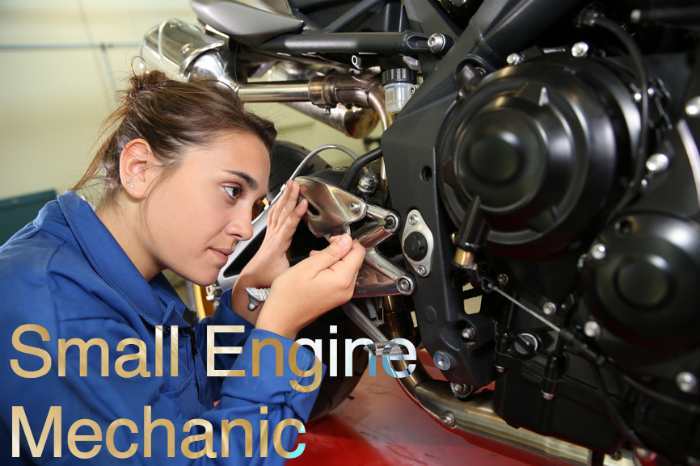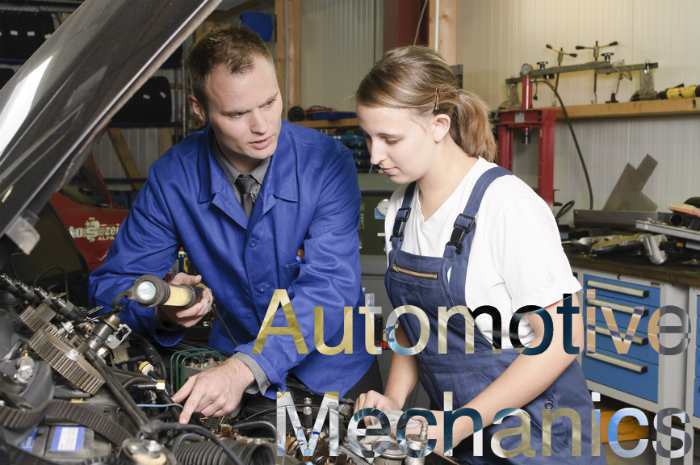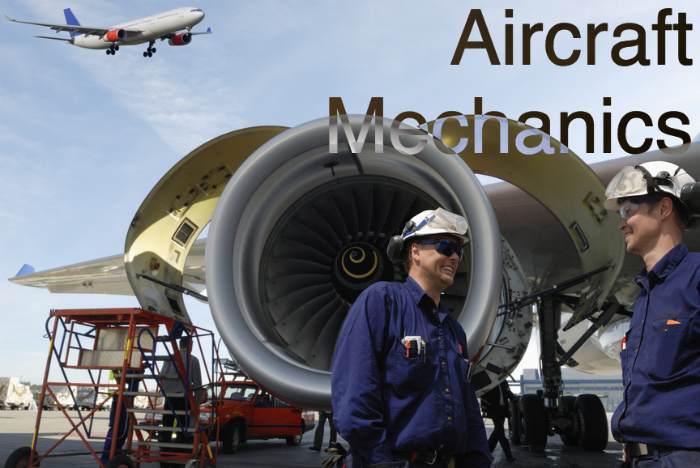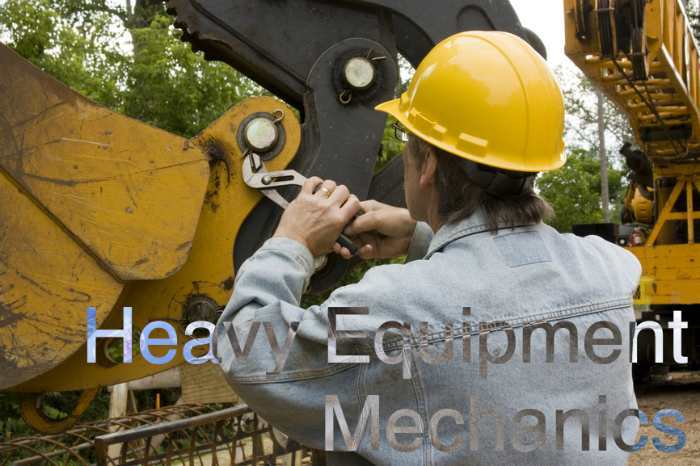With the mechanic industry reaching new heights, individuals who are contemplating a new career can look into the various employment opportunities in this industry.
Depending on the transportation or shipping company, different types of mechanics are needed to service the inner components and engine malfunctions that develop with regular wear and tear.
Understanding what each sector requires will help aspiring mechanics choose the right field of expertise when entering the workforce.
Automotive Service Mechanics
Also known as service technicians, automotive service mechanics inspect, repair, and maintain light trucks and cars.
Automotive mechanics need to be familiar with electronic systems and mechanical components, including engines, drive belts, transmissions, steering systems, and brakes.
Service techs need to be able to utilize various tools, such as computerized diagnostic tools, wrenches, and lathes.
Many companies that hire automotive mechanics expect them to fulfill certain job requirements, including the:
- Identification of mechanical problems with computerized diagnostic equipment
- Testing of systems and parts for potential malfunctions
- Maintenance and care of tires, oil, and fluid levels
- Repair of worn parts
- Disassembly and reassembly of system components
- Utilization of the proper testing equipment for effective repair and maintenance
- Communication of automotive diagnosis and repair plans to clients
Types of Automotive Mechanics
Some mechanics specialize in certain repairs that require specific regulations and procedures to be followed, while others work in general car repair environments.
Types of service technicians include:
- Automotive Air-conditioning Repairers: Mechanics work on installing and repairing air conditioners’ parts, including condensers, compressors, and controls. Governmental regulations apply to this position.
- Brake Repairers: Brake repairers adjust, replace, and repair the brake rotors, brakes, and brake pads on motorcycles.
- Front-end Mechanics: Front-end mechanics align, balance, and repair the wheels, suspension systems, and steering mechanisms. These techs need to be proficient in wheel-balancing machines and special alignment equipment.
- Transmission Technicians and Rebuilders: Auto technicians repair the gear trains, hydraulic pumps, couplings, and other components of transmission systems, requiring an in-depth understanding of computer controls.
- Drivability Technicians: Drivability technicians diagnose malfunctions that develop in gasoline-powered engines. They need to hold extensive knowledge in engine management, fuel, emission, ignition, and electrical systems.
Career Outlook
According to a 2012 report issued by the U.S. Bureau of Labor Statistics (BLS), the employment outlook for automotive service mechanics is predicting a nine percent increase in jobs across America by 2022, resulting in an additional 60,400 employment opportunities for mechanics.
Mechanics who choose a career in this expertise can expect an average annual salary of $36,610, with the lowest 10 percent making $20,810 and the highest 10 percent earning $60,070.
Auto Mechanic Training
Diesel Service Mechanics

Diesel service mechanics play an essential role in the inspection, repair, and overhaul of diesel-powered vehicles. Because of the durability and efficiency that comes with these engines, more and more industries are using diesel vehicles to transport goods and services across country and water.
Diesel mechanics can work on bulldozers, cranes, commercial boats, pickups, passenger vehicles, and work vehicles.
On top of using computerized diagnostic equipment to diagnose diesel engine malfunctions, mechanics will also utilize various machine and power tools to repair the engine, including pneumatic wrenches, grinding machines, welding equipment, and lathes.
Job duties will include:
- Test driving vehicles for malfunction diagnosis
- Following a checklist for procedure inspection
- Reading and interpreting test results through diagnostic equipment
- Raising buses, trucks, heavy equipment, or heavy parts with hydraulic hoists or jacks
- Inspecting brake systems, transmissions, steering mechanisms, and engines
- Performing routine maintenance by checking batteries and lubricating equipment
- Adjusting and aligning wheels, attaching components, and tightening bolts
- Repairing malfunctioning components, parts, and electrical or mechanical equipment
Types of Diesel Mechanics
Some mechanics work on electrical systems, while others work on engine repairs or exhaust system retrofitting.
Depending on one’s previous educational training, work experience, and field of expertise, diesel mechanics can find positions in the following industries:
- Automotive Service Mechanics: Mechanics work primarily on automobiles that are run by diesel-powered engines.
- Heavy Vehicle and Mobile Equipment Mechanics: Diesel technicians focus on the repair and maintenance of farm equipment, rail cars, and construction vehicles.
- Small Engine Mechanics: Mechanics diagnose and repair diesel engine malfunctions on motorcycles, motorboats, and small vehicles.
Career Outlook
A 2012 report by the BLS shows that the employment outlook for the diesel mechanic industry is going to bring an additional 21,600 jobs to diesel mechanics by 2022. Mechanics who specialize in this sector of the industry can earn an average annual wage of $42,320, with the lowest 10 percent earning $26,820 and the highest 10 percent making $63,250.
Check out diesel tech schools by state with all the requirements and salary information.
Aircraft and Avionics Equipment Mechanics
Working in repair stations, repair hangers, or on airfields, aircraft and avionics equipment mechanics repair and maintain aircraft, performing the Federal Aviation Administration’s (FAA) required aircraft inspections.
Because of the complexity of today’s aircrafts, mechanics need to be proficient in repairing, maintaining, and completing inspections on various airplanes, such as piston-driven airplanes, jets, and helicopters.
In order to work legally on civilian aircraft, mechanics need to obtain at least one of the FAA’s Airframe and Powerplant (A&P) certificates, which authorizes them to repair most parts on an aircraft.
Depending on the company and specialization, aircraft mechanics may need to fulfill the following job requirements:
- Examination of replacement parts for defectiveness
- Diagnosis of electrical and mechanical issues
- Identification of repair procedures
- Repair of brakes, wings, components, and electrical systems
- Replacement of defective parts
- Testing of aircraft components with diagnostic equipment
- Inspection of completed work to maintain performance standards
- Recording of repair and maintenance work
Types of Aircraft Mechanics
Some aircraft mechanics specialize in certain sections of airplanes, such as the hydraulics, engines, or electrical systems. Others work in independent repair shops, inspecting and repairing different types of airplanes.
Aircraft mechanics can find various employment opportunities in the sectors of this industry, including:
- Airframe and Powerplant (A&P) Mechanic: Airframe mechanics maintain and alter tasks on aircrafts, repairing engines, brakes, landing gear, and AC systems. Some positions require additional certifications and experience.
- Avionics Technician: Avionics technicians maintain and repair the electronic equipment on airplanes, including radio communications, navigation aids, radar systems, and computer systems. This sector often requires the A&P certificate as well as other licenses.
- Designated Airworthiness Representative (DAR): DAR mechanics inspect, examine, and test the airworthiness of an aircraft. These representatives issue airworthiness certificates, and mechanics can specialize as a manufacturing DAR or a maintenance DAR.
- Inspection Authorized (IA) Mechanic: IA mechanics perform comprehensive annual inspections and return aircraft to service. These techs need to have two A&P licenses in order to work legally in this sector.
- Repairman: Repairmen work on specific duties at a certified repair station and need to have a repairman certificate, which is issued by the repair station.
Career Outlook
According to the BLS, the employment outlook for the avionics industry predicts a two percent increase by 2022, which is slower than the national average.
This increase will provide an additional 3,500 jobs in the aircraft mechanic industry. Individuals who are contemplating a career as an aircraft mechanic can earn an average annual salary of $55,230, with the lowest 10 percent earning $35,190 and the highest 10 percent making $76,660.
Aircraft and Avionics Training
Heavy Vehicle and Mobile Equipment Mechanics
Heavy vehicle and mobile equipment mechanics inspect, repair, and maintain machinery and vehicles used in farming, construction, and rail transportation.
These mechanics repair engines, transmissions, hydraulic systems, and electrical systems for industrial, agricultural, rail, and construction equipment, ensuring the safety and performance of the brakes, fuel lines, transmissions, and components.
Utilizing diagnostic equipment to identify malfunctions, mechanics in this industry utilize various machine and power tools, including lathes, pneumatic wrenches, and welding equipment.
Job duties for heavy vehicle and mobile equipment mechanics may include:
- Reading and understanding blueprints, operating manuals, and drawings
- Performing scheduled maintenance
- Diagnosing malfunctions with computerized equipment
- Inspecting, repairing, and replacing defective components
- Overhauling and testing major components
- Disassembling and reassembling heavy equipment
- Traveling to worksites for large equipment repairs
Types of Heavy Vehicle Mechanics
Playing an essential role in numerous industrial activities, mechanics can work on tractors, bulldozers, cranes, rail cars, and other forms of heavy vehicles.
Depending on one’s previous education, certificates earned, and work experience, mechanics can find employment opportunities in the following sectors of the mechanic industry:
- Farm Equipment Mechanics: Some farm equipment mechanics repair and service farm equipment, such as harvesters and tractors, as well as smaller consumer-grade garden and lawn tractors. Others find employment in dealer repair shops, maintaining farm equipment.
- Mobile Heavy Equipment Mechanics: Mobile mechanics maintain and repair surface mining and construction vehicles, including cranes, bulldozers, excavators, and graders. Mechanics may find work at wholesale and distribution shops, large construction companies, and mining firms.
- Rail Car Repairers: Rail car repairers service railroad locomotives, rolling stock, and subway cars. They can find employment opportunities at railroad companies, rail car manufacturers, and private and public transit companies.
Career Outlook
A 2012 report released by the BLS shows that the employment outlook for this industry will provide an additional 16,200 heavy vehicle mechanic positions across America by 2022.
Mechanics who wish to work on heavy vehicles can earn an average salary of $43,820 annually, with the lowest 10 percent making $27,730 a year and the highest 10 percent earning about $62,960 a year.
Small Engine Mechanics

Small engine mechanics service, inspect, and repair motorized vehicles and equipment, specializing in motorcycles, outdoor power equipment, or motorboats.
Mechanics who enter this field of expertise determine the mechanical, fuel, and electrical malfunctions on various small engines, making the necessary repairs to ensure optimal durability.
Small engine mechanics utilize various hand tools, such as wrenches, pliers, and screwdrivers, to complete common repair tasks. They can also use compression gauges, voltmeters, and ammeters to test and diagnose engine performance levels.
Pneumatic power tools and diagnostic equipment are necessary tools for more complex procedures.
Small engine mechanics may perform the following job duties:
- Discussing maintenance plans, equipment issues, and customer requirements
- Performing routine engine maintenance
- Testing and inspecting malfunctioning engines
- Repairing and replacing defective, worn, and broken components
- Reassembling and reinstalling engines and components
- Recording inspections, work performed, test results, and parts used
Types of Small Engine Mechanics
Because tasks may vary in difficulty and complexity, some mechanics focus on the minor adjustments and replacements of certain components.
Others need to have an in-depth knowledge of the motorized vehicle’s components, such as spark plug replacement and piston calibration, to take the engine completely apart.
Individuals can specialize in a certain sector, finding employment as:
- Motorcycle Mechanics: Motorcycle mechanics repair scooters, motorcycles, dirt bikes, all-terrain vehicles, and mopeds. These technicians service transmissions, engines, ignition systems, and brakes, with most working for individual dealers.
- Motorboat Mechanics: Motorboat mechanics repair and maintain the electrical and mechanical components on boat engines. Many mechanics find work at docks and marinas, working on propellers, marine plumbing, steering mechanisms, and boat equipment.
- Outdoor Power Equipment Mechanics: Outdoor power equipment mechanics service outdoor power equipment, including hedge trimmers, lawnmowers, portable generators, and garden tractors.
Career Outlook
According to the BLS, the employment outlook predicts a six percent increase in jobs across America, providing an additional 3,800 employment opportunities by 2022.
Individuals entering this sector of the mechanic industry can expect an average annual salary of $32,640, with the lowest 10 percent earning $20,490 and the highest 10 percent making $51,040.
Small Engine Training
When it comes to job stability and career advancement opportunities, finding a job in the mechanic industry is a sure-fire way to obtain a decent salary at an upstanding company.
With the appropriate educational training, individuals who enjoy working with their hands and taking apart engines will find various employment opportunities in the mechanic industry.



